We’ve probably all tried at least one of these at some point. Cut way back on carbs, drink special (expensive) shakes instead of regular meals, or just take a supplement that promises to boost your metabolism. And while you may have some initial success, these are hardly things that are sustainable for the long term.
And never mind that quick fixes are rarely things that will improve your health. Let’s face it, quick fixes are rarely things you can stick with. But long-term, sustainable habits are rarely talked about. Why? They just aren’t sexy or the making of exciting headlines.
As a dietitian, I’d rather that we all focus on the kinds of goals that are actually sustainable.
In this article, I’ll be sharing my top 10 sustainable habits you can choose from to make 2024 your best year yet, without trying to stick to a doomed-to-fail diet program.
Table of Contents
How to use this list
The purpose of this blog is to provide you with guidance to improve your health from a broad, holistic perspective. Keep in mind that “health” can encompass many different things. Everything from our physical health to mental health, financial health, and even environmental health.
This list is a good place to start and within each habit are a variety of ideas you can try to help accomplish your goals.
I recommend picking 1-2 of the suggestions that grab your attention first and beginning with those; trying to tackle ten new habits is too much!
Habit 1: Eat More Fruits and Vegetables
A simple thing you can do is add just one more serving of fruits or vegetables to each of your meals. Maybe it’s berries on your yogurt in the morning, adding beans to your salad or soup for lunch, or having two vegetables with dinner instead of just one.
This habit is a “low-hanging fruit” because most of us are eating far fewer fruits and veggies than are recommended. And eating enough fruits and veggies is far more powerful than any greens powder or expensive “elixir.”
Fruits and vegetables are loaded with antioxidants and fiber that help protect our hearts, brain, and GI tract and may help reduce the risk of diabetes. They also have the added benefit of being lower in calories and filling.
How to bring this habit to life:
Adding an extra ½ cup to each meal might mean you cut back on some higher calorie items and can help fill you up so you snack less later.
- Add ½ cup of berries or cut fruit to yogurt
- Add frozen fruit to a smoothie
- Add baby leafy greens to a sandwich and mash ½ an avocado to use as a spread in place of mayonnaise.
- Eat the rainbow – yes, get a variety of different colors of fruits and veggies on your plate. While leafy greens and cruciferous veggies and berries are great, don’t forget about the gorgeous orange and red-hued veggies like sweet potatoes, winter squash, carrots, tomatoes, and peppers. Or purple-colored like eggplant and cabbage or one of my favorites – mushrooms.
- Fill ½ your dinner plate with veggies and split the other half between protein and grains.
Habit 2: Get Regular Physical Activity
Personally, this is my big health goal for the New Year. I’ve been working on walking more or hopping on the elliptical a few times a week but I know that there is room for more. It is amazing how much better I sleep when I exercise and it’s good for my mental health too.
Now getting more exercise doesn’t mean you have to join a gym or have expensive exercise equipment. Almost everyone can do this, no matter what your ability or budget. Always check with your health care provider before starting any exercise program but just moving a bit more will make a huge difference.
Research has even shown you get health benefits from doing a few shorter bouts of exercise too. That means you can split it up into 10-minute segments periodically during the day if you don’t have time for a full 30-minute session all at once. Even 10 minutes every day is better than nothing at all!
How to bring this habit to life:
- Take a short walk 3 times a day.
- Join an online yoga class if you can’t go in person.
- Park a little further away from the store and walk (as long as it is safe to do so).
- Take a walk around the shopping mall. Many malls open early in the morning for walkers. This is great during cold or really hot months and you can go at your own pace.
- Find a class you’ve always wanted to take. Maybe it’s pickleball (on my list!), or pilates or yoga. Try something new this year to move a little more.
Habit 3: Shop from a List and Buy Only What You Need
Spending a little time before you get to the grocery store is a great sustainable habit in more ways than one. You end up eating better because you’ve planned ahead and then don’t spend money on foods you won’t or can’t eat, wasting less money and less food.
How to bring this habit to life:
- First, write out your meals for the week before you head to the store. Check your pantry to see what you already have on hand and then add only what you need to your list. Don’t forget to figure in some snacks too.
- Second, make a list based on your menu. Sticking to that list means we’re only getting what we’ll actually use, reducing the chances of fruits, veggies, or other perishables going bad before we can enjoy them.
It’s like having a game plan to use up what we buy, which not only saves money and saves calories, but also means less food ends up in the trash. Good for your health and pocketbook – and good for the planet too.
Habit 4: Practice Mindful Eating
Have you ever finished a meal and thought, wow, I ate that fast, or worse, you don’t remember eating because you were busy doing something else? I get it. You’re busy and it feels like you’ll save time by eating while you work or grabbing something quickly as you’re out running errands.
But when we savor what we are eating, pay attention to what is on our plates, and listen to our body’s signals, it helps us appreciate what we are eating more and possibly helps us cut down on what we’re eating.
Mindful eating isn’t just good for us; it’s great for the environment too. By being aware of portion sizes, and preparing and eating only what we need, we’re not only nourishing ourselves but also reducing our environmental footprint. It’s another win-win!
How to bring this habit to life:
- Sit down at the table when you are eating.
- Turn off your phone and get away from screens
- Put your fork down between bites.
- As you are eating, think about how you would describe the flavors and texture of the food you are enjoying.
Habit 5: Prioritize Quality Sleep
You probably know that getting enough sleep is important for your overall health, but as we get older, sleep, especially quality sleep can elude us. Most experts recommend that adults should aim for 7 to 9 hours of sleep a night.
Many things can affect how well we sleep as we get older, from hormonal changes to changes in our circadian rhythm to struggles with pain or increased stress. But, that doesn’t mean we should throw in the towel.
How to bring this habit to life:
The first step is understanding what is causing or contributing to poor sleep.
- Keeping a journal can help pinpoint what might be going on. Are you waking up because of pain? Are you too hot or cold? Do you wake up with your mind racing or thinking of things you need to do?
- If you see a trend, this can give you a specific problem to target.
- Write a list of things you need to do the next day after dinner and keep a notepad next to the bed in case you think of something in the middle of the night.
- Turn the thermostat up or down a bit. Most people sleep better when it is a little cooler in the house, but everyone is different.
- Exercising earlier in the day may help with stress reduction and sleep.
- Make sure you drink enough water during the day – BUT stop drinking a few hours before you hit the hay.
- Drink less alcohol
- Try some chamomile tea or tart cherry juice a few hours before bed to see if natural relaxants or sleep aids help.
Habit 6: Drink More Water
Did you know that 55 to 65 percent of your body is water? Water is the most important nutrient we need every day and yet not everyone gets enough daily.
While this is mainly an issue in elderly people, many of us could pay closer attention to how much we are drinking. Some reports estimate that 75 percent of adults don’t drink enough water!
Why is getting enough water so very important? Water helps us with digestion and delivers nutrients throughout our body. It keeps our joints lubricated and helps moisturize our skin. It helps our kidneys flush out toxins and can help us feel full.
You may have heard that you need to drink 8, 8-ounce glasses of water a day but that rule doesn’t really hold up. The Institute of Medicine currently recommends between 9 and 11, 8-ounce cups a day for adult women and men, respectively.
This amount sounds like a lot but it includes fluid from other beverages, including decaf tea and coffee, milk, and juice. The majority should come from pure water, but other fluids do count as well.
What happens if you don’t get enough water and how can you tell if you aren’t getting enough?
- You can feel tired and sluggish
- You may not sleep as well, or as deeply
- You can develop a headache and decreased alertness
- You may feel constipated
- Your pee may be dark yellow. (It should be clear to light yellow)
How to bring this habit to life:
- Start your morning off by drinking a glass of water before you do anything else.
- Add an extra piece of fruit to your lunch or for a snack. (Fruit contains a lot of water and it counts!)
- Freeze berries, lemon or lime slices, or mint leaves in ice cubes. Use these cubes to cool your water and add a flavor boost.
- Enjoy a cup of herbal tea in the afternoon – it counts!
- Check out my article on fun drinks you can make to add more water to your day.
Habit 7: Find a Way to Lessen Your Stress Level
Stress is all around us and honestly, a part of life. But learning how to manage it or find ways to minimize it can go a long way to improving our health and may improve your energy level while you’re at it.
Here’s the bad news: chronic stress can affect how well you sleep, what you eat, your digestion, and how well you focus and think. If reducing stress is one of your goals for the new year, see if one of these tips may be a sustainable habit that might help.
How to bring this habit to life:
- Try time blocking. If you haven’t heard of this before, it’s a way to focus your energy to tackle tasks in one sitting. Set aside an hour in the morning and one in the afternoon for you to focus. No interruptions. Turn your phone off, shut your door if you need to, and get that thing that is hanging over your head done.
- Take 5. That means getting up from your computer and walking around. Raise your arms over your head and stretch!
- Take a deep breath! One of the best ways to manage stress is through deep breathing. There are a variety of apps you can use to help guide you with this. One of my favorites is the Calm app. Close your eyes, take a deep breath, and then let it out slowly. Doing this a few times every hour can help lower stress.
- Work on time management. Maybe it’s making a list, tackling things one at a time, or asking for help.
- Consider working with a therapist – this can be one of the appointments you schedule soon.
- Learn to say “no.” It’s probably the hardest word for some of us to say.
Habit 8: Spend Time Outside
Getting a little fresh air every day may help lower your stress level and improve your health. Studies have shown that people who spend more time outdoors in nature have lower stress levels, lower rates of depression, and increased attention spans.
Getting a little exposure to sunshine can also help build up our vitamin D levels, which helps support a healthy immune system and may help regulate our internal body clock.
If you are someone who sits in front of the computer screen all day, set aside some time to get outside, even if it is cold out. Even 5 minutes a day may do you a mountain of good.
How to bring this habit to life:
- Take a quick walk around the block
- Take the dog out for a quick game of fetch.
- Stand outside and let the sun hit your face for 5 minutes.
- Plant a garden! A vegetable garden, herb garden, or just a variety of flowers. You’ll need to tend to it regularly, will have fresh veggies, and will enjoy beautiful colors throughout the spring, summer, and fall. Double benefit – those plants help clean the air and reinvigorate the soil.
Habit 9: Schedule Those Health Check-Ups
You make sure everyone in the family has their appointments scheduled, but what about you? Don’t skip out on these because you are busy. Think about it this way; you make time to get your hair cut or nails done, right? Your annual health check-ups need to be a priority, too.
Getting to your PCP, the dentist, scheduling your annual mammogram, and your annual eye exam can help spot any issues early, or even better just assure you that you are doing the right things!
This is one habit that should be on all of our lists.
How to bring this habit to life:
Commit now to set aside an hour during the first week of the new year to make those calls and get the appointments on your calendar. Once they are scheduled, it will be harder to ignore!
Habit 10: Set Aside Time For YOU!
Now you may be thinking, aren’t all of these about setting aside time for me? In a way yes, but the last sustainable habit is more about finding something that you love to do and making time to do it.
How to bring this habit to life:
- If you love to read but don’t have time, set aside 20 to 30 minutes every day to curl up with a good book. Reading a book before bed makes it easier for your body to fall asleep than being in front of a screen.
- Schedule time with a friend and go for a walk. Or get together for lunch or dinner.
- Schedule a date night with your significant other. You don’t have to go out. Cook a meal together, find a good movie to watch, or join a tennis or pickleball club!
- Take a Saturday and go explore your town or something nearby.
Bottom line
Being healthy isn’t about a number on the scale. Certainly, weight plays an important role in our health but there is so much more involved which is why finding some sustainable habits will help your overall health and help you feel more vibrant and energetic.
Pick one or two from this list to focus on at a time. Maybe it’s getting more exercise (my hand is raised here!), working on getting better sleep, or drinking enough water to stay hydrated. Find one, set a goal, and then plan out how you will accomplish it.
It might help to start a journal. Write down how you feel daily and the changes you are making. After a month, take a look back and see if you can see a trend. Once you start noticing how much better you feel you might find it easier to stick with that habit and keep going.
What are you going to focus on this year? Hop over to my Facebook page and let me know which of these habits you’re going to work on this year and let’s support each other!
And don’t forget to join my email list for monthly updates and tips to improve your health.

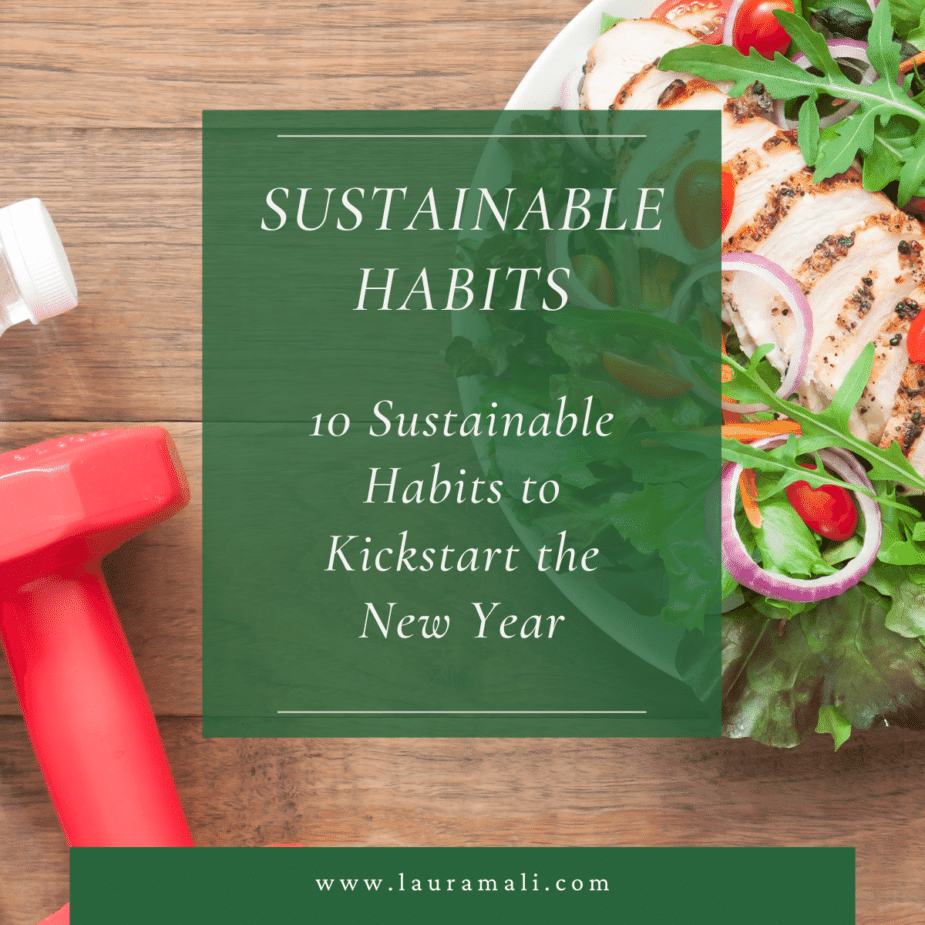

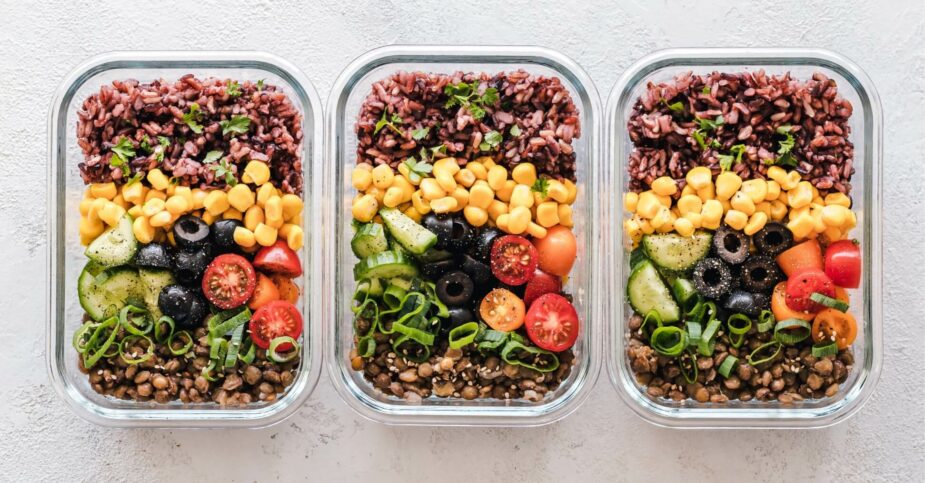

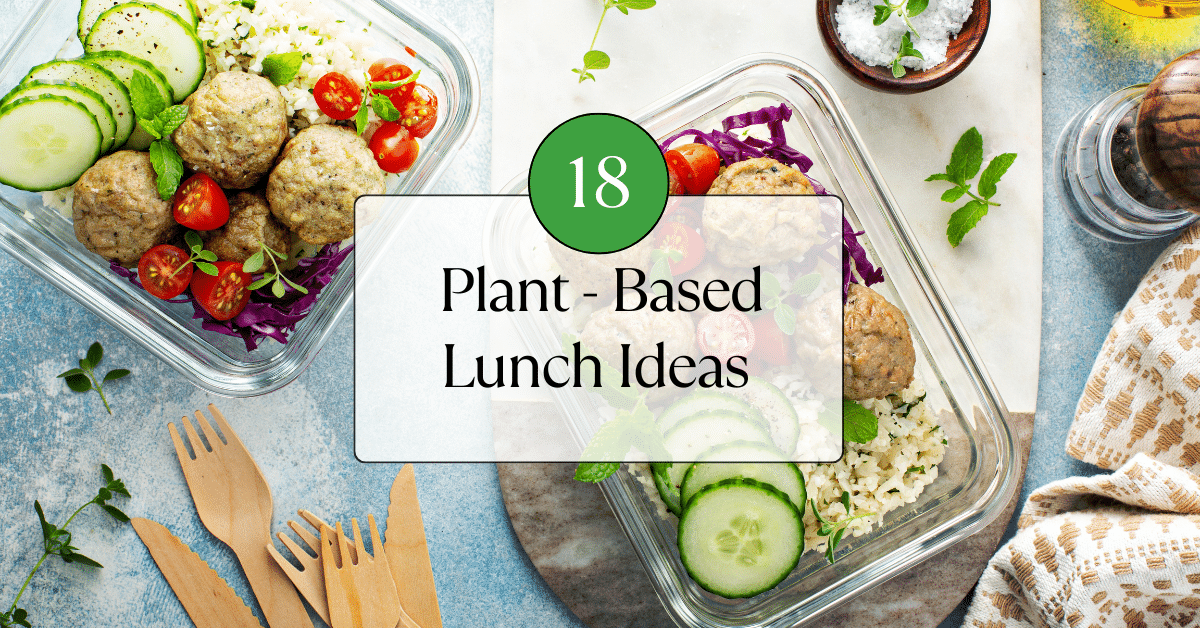
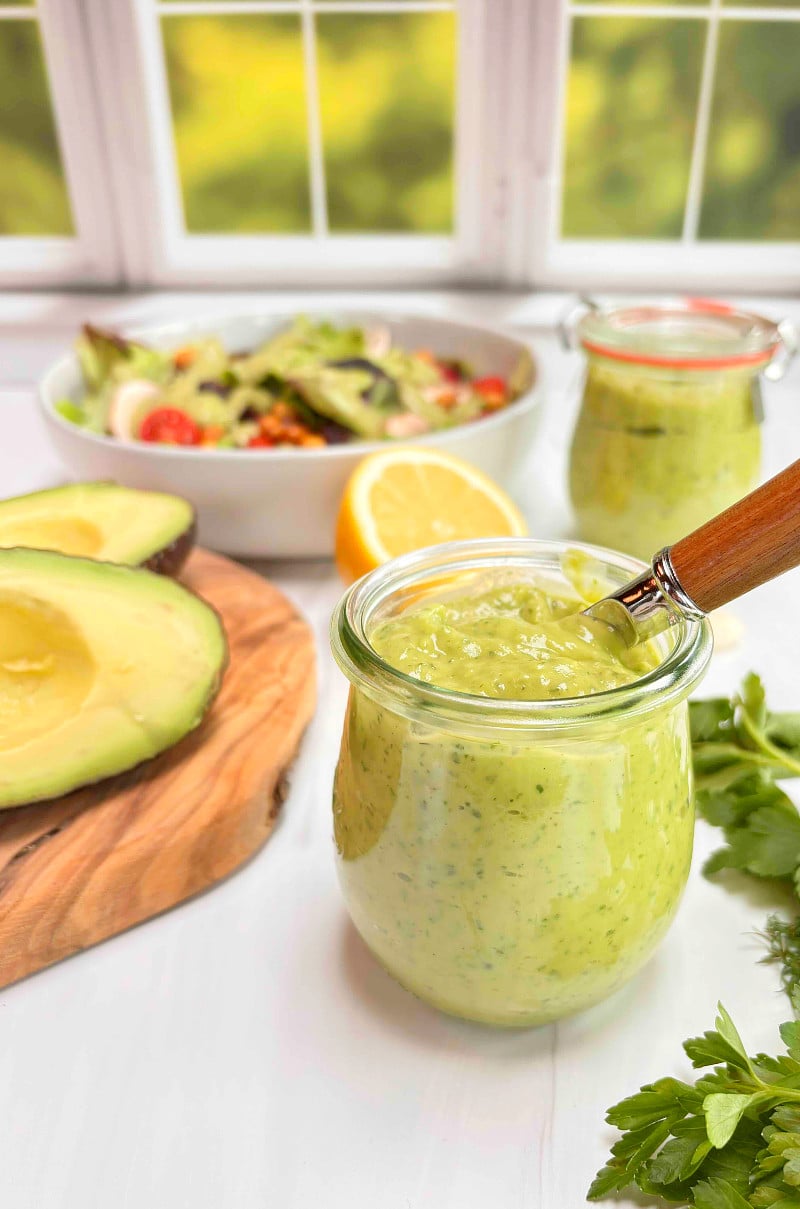

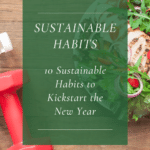
4 thoughts on “10 Sustainable Habits to Kickstart the New Year – and boost your energy and overall health too!”
Excellent article Laura, I’ll refer back to this as I work on these in 2024. I’m starting with drinking more water. Also will share with my siblings.
Thanks Cheryl! Drinking more water is a great habit to start. It helps with so many things. I know I don’t sleep well when I don’t get enough water during the day so it’s a big one for me too.
Thanks, Laura! You always have great ideas!
You’re welcome! I’m glad they are helpful!